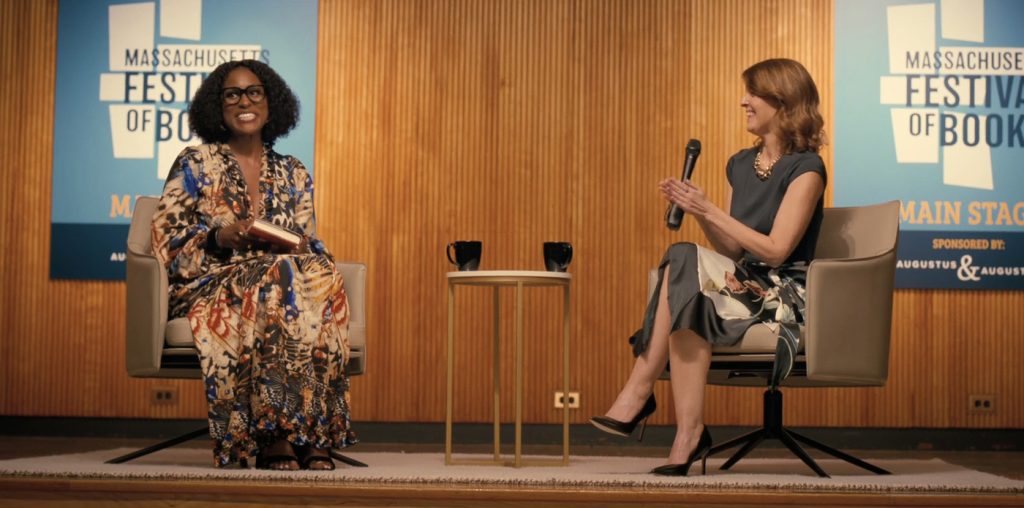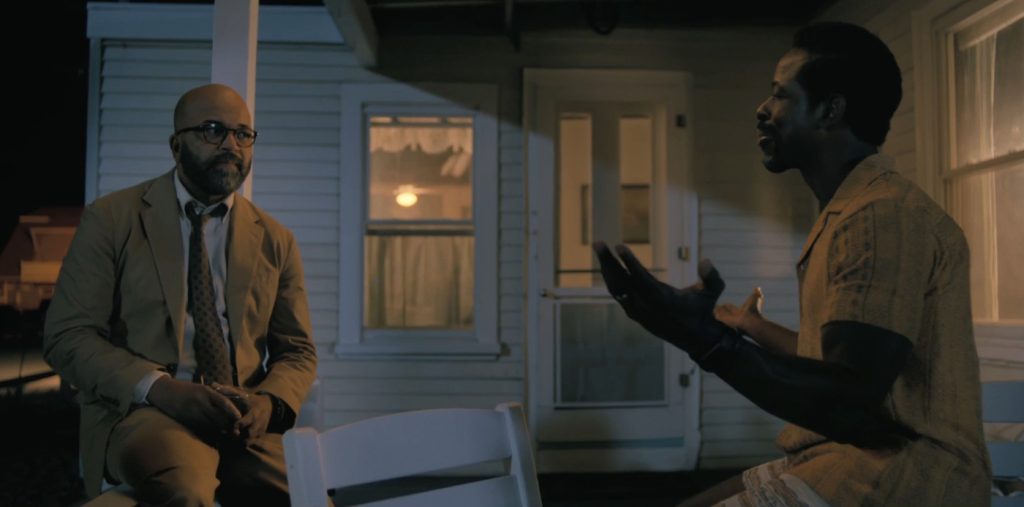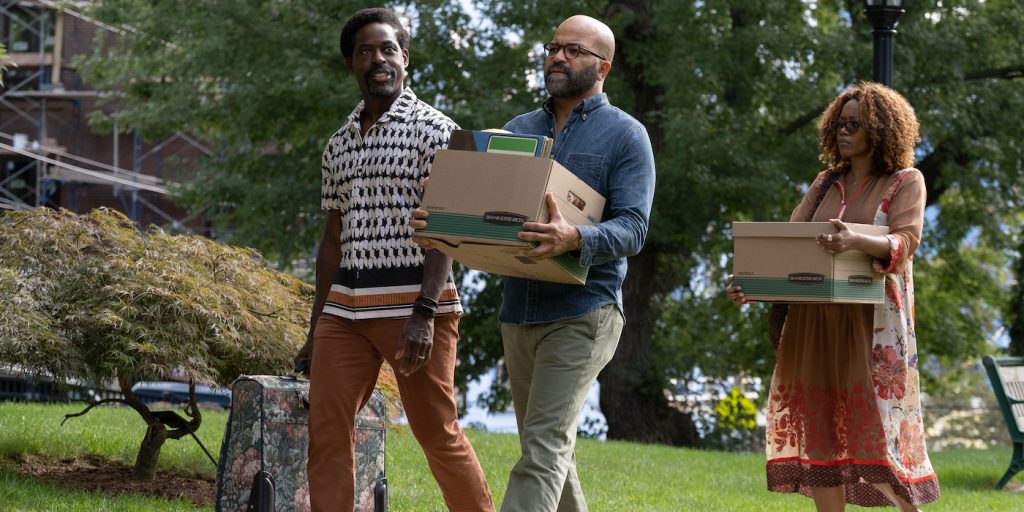“American Fiction” Star Jeffrey Wright Authors a New Chapter in a Stellar Career
Jeffrey Wright has found a great role as Monk Ellison in writer/director Cord Jefferson’s American Fiction. The story is based on a 2001 novel called “Erasure” by Percival Everett and centers on a professor and writer fed up with the way the literary world limits how Blackness is portrayed in pop culture. In response, Monk writes a blatantly stereotypical novel full of gangs, thugs, and criminals using a pseudonym. To his shock, it becomes a runaway hit and critical darling, leading him to a windfall of cash and an existential crisis.
So far, the film has won awards in nearly every film festival in which it was played, and most recently, was named one of the top ten films of 2023 by the AFI and best film of the year by the Washington Area Critics Association. American Fiction benefits from not only Wright’s scintillating performance but the many compelling scenes between him and the stellar ensemble cast, which includes Sterling K. Brown as Monk’s brother Cliff, Issa Rae as successful novelist and Monk provocateur Sintara Golden, and John Ortiz as Monk’s agent, Arthur.
Wright discusses his work with Jefferson and members of the cast, including Issa Rae and Sterling Brown, considers how the film centers the importance of family and acceptance, and more.
What kinds of discussions did you and Cord have about Monk?
We really didn’t have a lot of discussions. We really knew Monk’s journey, and I just got him as a character. In terms of Cord, on both the creative and professional side as well as the personal side, there was a lot of overlap to his own story. That was true for me as well, certainly on the personal side, in terms of his relationship to family and to his internal dialogue that he has with himself, and maybe a bit of self-isolation. Cord says that when he started reading the book, he heard my voice as Monk in his head, and he felt that Percival Everett had written that book for him personally. In some ways, I guess in terms of novelist, filmmaker, and performer, it’s akin to three musicians who get together and just start playing their instruments, and they’re just on the same page from the start.
How did the novel “Erasure” impact your approach or resonate with you in terms of how you got into the work?
I actually read the book later, and in reading the novel, I saw that Cord had really reshaped it in his own image. The novel was set in DC, and he completely reworked some of the catalyzing events, but there were certain things from the book that were useful to me. I absolutely loved those meditative moments where Monk drifts off and starts describing fly fishing, or the intricacies of woodworking. That stuff really spoke to me in communicating his inner solitude and the peculiarity or the personal quality of his interests relative to what might be perceived from the outside.
There’s a scene between Monk and Sintara, Issa Rae’s character, about his book that’s pretty central to the spirit of his conflict. Maybe one way to see that scene is how artists approach societal change from the inside or from the outside.
I think that Cord’s casting Issa and her agreeing to do this film legitimized that scene in a way that didn’t require much more from me because she was in on the joke, but she also lent credibility to the argument that is needed at that moment to confront Monk. Because at the end of that discussion, I don’t think we know or should know who is right. Maybe both are right, maybe neither is right, or maybe there’s a synthesis somewhere in between.

How did you, Cord, and Issa work to build that scene?
Issa was so helpful to me. At one point, prior to filming, I worked through the language with Cord because I do feel that scene is kind of the thesis of the film. I wanted to make sure Monk’s argument was properly shaped, so we talked through a few things; I added some stuff just to have the thoughts there, and then we trimmed some of the stuff away. When I had all this stuff in, and we were rehearsing, Cord asked Issa, “What’s your impression of him?” and she said, “Well, he’s just ridiculous.” I felt so deflated, but it was helpful because I didn’t want him just to be perceived in her eyes as ridiculous. I wanted him to be seen as having a particular perspective, a well-considered one that wasn’t in line with hers, but I didn’t want him to seem absurd. That became my challenge in that scene. Cord was super smart in inviting intelligent actors into the room because not only are they acting partners, but they become assistant directors, too, in terms of what they offer you.
The cast you were with on this film is exceptional. How did you develop what the audience sees between you and Sterling onscreen?
We didn’t have a lot of time. It was 25 days. The only things that we really had to work out, on the day, were just blocking, flowing through the space, and making the shots work. Sterling’s such a powerful and interesting, and in this instance, ironic actor. I think I met Sterling the morning we shot. I had met him in passing before. We showed up that morning, we got together and talked through some stuff, and the vibe was good. Went back to our trailers for a second, let them set up the shot, and then we showed up to do the scene. What was cool was that Sterling had said that he hadn’t planned on working during that period, for whatever reason, and he read the script, and he said he had to be in this film. That was the sense from everyone.

They’re very compelling characters.
Exactly. John Ortiz, whom I absolutely adore and have known for over 25 years from the theater in New York but had never worked with, just wanted to be a part of this and play that role, to play the agent. He’d never been asked to play an agent before; he’d always been asked to play characters in relationship to different types of worlds, whether it’s violence or criminality. He’d be the cop, or he’d be on the other side, but he’d never been asked to play a literary agent. We come from a fairly similar theatre background. I remember we were filming a scene, and John had an idea to shoot it in a slightly different way, but Cord is smart. He got a brilliant group of actors in the room.
Referencing this film, you are quoted as saying, “Without family, there is no revolution.” American Fiction is ultimately telling a story of family and belonging and transformation, and that’s what stays with viewers after the credits roll.
If there is something revolutionary about this film, and I use that term playfully, it is in the ordinariness of that family, and I love that. The film is not trying to answer questions, but I do think there is a response to the social commentary woven through it, and that is the madness and dysfunctionality and functionality and the uneasy love that we see inside that family because it’s like most people’s family, except this one isn’t articulated by a group of people that, at least, cinematically, we expect to see in that way. I think that’s really cool. I think it’s also an invitation to people across backgrounds to find themselves within the story, and maybe that’s what we need at this time, just some connection with people who we think are the other and some common ground to walk together. Inside of the couple of hours we’re watching this film, I think we have an opportunity to do that.

Erika Alexander as Coraline in writer/director Cord Jefferson’s AMERICAN FICTION
An Orion Pictures Release. Photo credit: Claire Folger. © 2023 Orion Releasing LLC. All Rights Reserved.
American Fiction is in select theaters on December 15th and expands nationwide on December 22nd.
For more interviews with great filmmakers, check these out:
“Saltburn” Cinematographer Linus Sandgren on Creating a Fluid Painting for Emerald Fennell
Featured image: Jeffrey Wright stars as Thelonious “Monk” Ellison in writer/director Cord Jefferson’s AMERICAN FICTION. An Orion Pictures Release. Photo credit: Claire Folger. © 2023 Orion Releasing LLC. All Rights Reserved.



